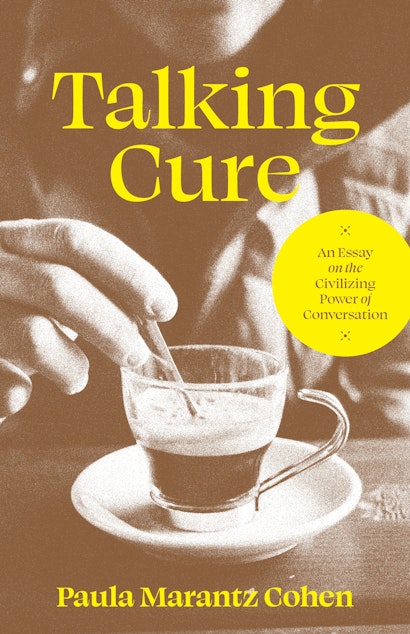I come from a family of talkers. The household in which I grew up was always noisy. My parents were loud and opinionated, and interrupted and quarreled boisterously with each other. I realize that such an environment could give rise, in opposition, to taciturn children who seek quiet above all else. But for me, the prevailing atmosphere felt comforting and safe. It made my childhood home a place I loved to be.
The bright, ongoing talk that pervaded my growing up was overseen by my mother, a woman of great charm and energy. She was the maestro of the dinner table, unfailingly entertaining and fun. We loved to listen to her tell stories about what happened to her at work. She was a high school French teacher, a position that afforded a wealth of anecdotes about her students’ misbehavior, eccentric wardrobe choices, and mistakes in the conjugation of verbs. There were also the intrigues among her colleagues—how I loved being privy to my teachers’ peccadillos and romantic misadventures, an experience that sowed a lifelong skepticism about authority. My mother had the gift of making even the smallest detail of her day vivid and amusing.
My father, by contrast, was a very different kind of talker. A scientist by training and vocation, he had a logical, detached sort of mind, and his subjects for discussion were ideas. He had theories about things: why people believed in God, the role of advertising in modern life, why women liked jewelry, and so on. I recall how he would clear his throat as a prelude to launching into a new idea: “I’ve been thinking about why we eat foods like oysters and lobster, which aren’t very appealing. There must be an evolutionary aspect to why we have learned to like these things.” Being included in the development of an idea with my father was a deeply bonding experience. The idea of ideas became enormously appealing as a result. And though my father was not an emotional person—and indeed, because he was not—ideas became imbued with feeling in being associated with my relationship with him.
My talk with my parents was not entirely reciprocal. They led and I followed. But, then, they were my parents and not my peers. I expected them to know things I didn’t and to control the direction of our talk.
The case was different with my sister. Siblings present us with unique challenges. Because we arrive in our families at different times, we are inevitably thrust into hierarchical relationships and must learn through acts but also, and perhaps more importantly, through words, how to share. For me, the transition from older sister to equal partner in conversation with my sister was particularly difficult, perhaps because she and I were so superficially similar in interests and talents (her talents in many ways superior to mine). For a long time, I clung to the status of older sister as the one element of superiority that I could continue to claim. I still sometimes feel myself trying to one-up or overexplain to my sister, but I have fought against this tendency; I have come to see the sibling relationship as a practice space for conversational relationships outside the family that require equality and reciprocity to be authentic and satisfying.
My mother died over twenty-five years ago of a progressive neurological illness, and though we continued to communicate until almost the end, her ability to tell me stories and to perform for me diminished as she grew sicker. My father died last year after being slowly taken over by dementia. Over the previous two years, he more or less stopped talking. This was sadder for me than the diminishment of my mother before her death, which still allowed for our emotional connection, but it was also less difficult to handle. Since my relationship to my father was almost entirely intellectual, that loss of our ability to share ideas made him seem like another person, the mere shell of what he had been. And so, though his body, still relatively healthy until the end, recalled the past, it didn’t actually denote the person. I realize that I marked my father’s passing from the time he stopped being able to engage with me intellectually.
My conversation with my sister continues. It is a vital part of my life. Though not the same kind of conversation that we had as children and I think far more equal than it once was, it carries the imprint of that earlier time. We often talk about the past, about our differing views of our childhood and our parents, and about our aspirations for ourselves and our children. There is an undertow to sibling conversation—an antecedent life that moves beneath the words, that allows for shared hilarity at things that others don’t find funny, and for understanding of the most minor and seemingly trivial inflections or facial expressions (siblings can get angry at each other for a fleeting smile or raised eyebrow that no one else would ever notice). My sister and I are attuned to each other this way, but also aware of how our past in the family can pull us down, which makes us extremely careful and conscientious with each other.
I have described my family of origin in some detail to offer one template for the relatively closed system in which we all begin our lives and gain the tools by which we proceed to communicate beyond it. If I learned how to talk in my family of origin, that original space was, for all its liveliness and interest, narrow in its scope and idiosyncratic in its lexicon. This is the paradox of growing up. Language is learned in the family; it is the means of both solidifying our place within it and allowing us to move beyond it, giving us the tools to widen our experience with people very different from ourselves.
Most of us are destined to outgrow our families of origin—thrown by necessity into the world by school and friendships that develop early and help us move away from that first, inbred space. But living in a larger world is difficult, and it is easier to embrace thinking and behavior that recapitulates in some way the safety of that initial family. Sects of various kinds (and I use the term “sect” loosely) are insidious in that they provide an illusion of freedom from our past while keeping us confined to ideas and values that never get a chance to be tested, elaborated, or changed. And they make those outside of our group seem strange and threatening.
Marriage—or long-term, intimate partnership—is a special case. I recall a friend telling me before I got married that my union with this other person would allow me to refresh the subjects and style of conversation to which I had become habituated. This was certainly true in the beginning. And indeed, it makes the early stages of intimacy difficult. When we live in proximity with someone else, we have to adjust ourselves to a discourse developed in another family of origin and that can be awkward and even unpleasant, a wrenching away from what we know and feel comfortable with. Ultimately, it is a process of synthesis—of our own lexicon with that of the other person—and I estimate that it took my husband and me half a dozen years or so to achieve this.
Eventually, however, if the relationship persists and deepens, one develops a new kind of predictable language, as second nature as the discourse we were bred to. In creating our own families, we can’t help but close ourselves off again, to some degree, from the larger world, replacing one kind of circumscribed vocabulary with another. This can provide a sense of safety and well-being, useful, especially if children are involved, but also a barrier to free exchange with what lies beyond. For in becoming predictable and known, conversation within the family—whether the family of origin or the family we make—cuts us off from difference. To speak to the converted or the entirely familiar is not to truly converse. It is to have one’s beliefs reinforced; it is self-soothing but not self-developing.
In past eras, daily life made it necessary for individuals to engage with others different from themselves. Families were larger and more extended rather than small and closed, and so people were often in contact with cousins and more distant relatives of the sort we see now only at Thanksgiving or know about through Ancestry.com. It’s true that pronounced ethnic, religious, and class barriers kept various groups apart from each other in unjustly prescribed ways. Nonetheless, the serendipity of having to move around in literal space created unpredictable encounters. People were forced to engage with others in order to carry on the business of their lives.
That element of serendipity has now diminished. For all our espousal of difference and diversity, we have become a nation of factions and tribes, our thinking, in so many instances, hardened into repetitive patterns of agreement or opposition. The rise of social media, while it provides access to people in far-flung places, also supports a narrow sectarianism of ideas and feeds mockery and mean-spiritedness. The COVID-19 pandemic has exacerbated these tendencies of isolation and repetition. Many people nowadays engage only with those whose views and life experiences mirror their own.
But to recirculate the same ideas within a closed group is likely to poison our sense of those outside that group and make society a site of continual conflict and enmity. And perhaps worse is the harm we do ourselves. If we simply mouth platitudes of agreement, we must harbor the secrets of our individual natures within our own breasts, and this can turn toxic to our mental health. To share who we are, in our essential uniqueness, is one of the most human and creative of acts. I believe that most all of us need good conversation to lift our spirits, connect us to others, and give us a more solid sense of ourselves.
This selection is an excerpt from Talking Cure: An Essay on the Civilizing Power of Conversation, by Paula Marantz Cohen.
Paula Marantz Cohen is Distinguished Professor of English and Dean of the Pennoni Honors College at Drexel University. Her books include Of Human Kindness: What Shakespeare Teaches Us about Empathy; Alfred Hitchcock: The Legacy of Victorianism; Silent Film and the Triumph of the American Myth; and the bestselling novel Jane Austen in Boca.

